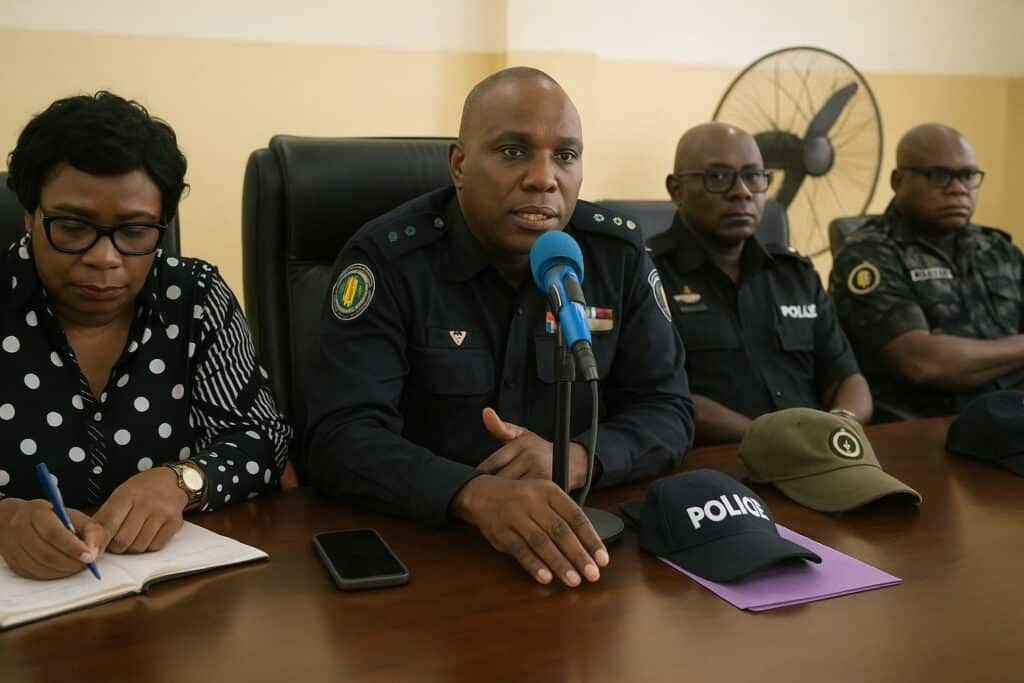Field command in the 7th district
On 12 September 2025, well before the tropical dusk settled over Brazzaville, the Commander of the Congolese Police, General André Fils Obami Itou, arrived unannounced in the streets of Mfilou, the capital’s populous seventh arrondissement. Flanked by the district’s mayor, Bibiane Kouloumbou, he crossed the dusty esplanade where block leaders and quartier chiefs had gathered after a summons issued barely twenty-four hours earlier. According to a communiqué from the Ministry of the Interior released the same evening, the visit formed part of a broader series of “citizen encounters” launched in early September to recalibrate urban security operations after a surge in youth-led offences (Ministry of the Interior press release, 13 Sept 2025).
The choice of Mfilou is not anecdotal. The district has recently been singled out by police analysts as one of the areas where the phenomenon of kuluna, or so-called “bébés noirs”, is most entrenched. Petty extortion at bus stops, night-time assaults and the intimidation of informal traders have rekindled public anxiety, prompting civic calls for a firmer yet inclusive response.
A participatory doctrine of security
Standing beneath a tarpaulin hastily erected to shield participants from the midday sun, General Obami Itou repeated a credo that has featured prominently since his appointment last year: “No police force, however well equipped, succeeds in isolation; it prospers only through the active complicity of the population.” The statement, delivered in Lingala and French, encapsulates a strategic pivot toward community policing, inspired in part by precedents in Cameroon’s Douala and Rwanda’s Kigali, where neighbourhood cells have proved effective in deterring violent crime (Brazzaville News, 12 Sept 2025).
Concretely, the model assigns quartier chiefs the dual role of social mediators and intelligence relays. They are encouraged to report suspicious gatherings, identify abandoned dwellings ripe for criminal occupation and, crucially, reassure residents hesitant to engage with uniformed officers. In exchange, the police commit to feedback loops: information received is to be acted upon within forty-eight hours, and progress reports are to be shared at fortnightly briefings hosted by the mayor’s office.
Voices from the neighbourhoods
Many of the local leaders present voiced both concern and cautious optimism. Albert Bafouakoua, chief of the Domaine quarter that hosted a similar meeting a week earlier, observed that “our young people need not only repression but prospects; the General’s presence is a signal that the State is listening.” Others, like block counsellor Clarisse Mabiala, stressed the importance of anonymity in tip-offs, fearing reprisals from gang members who often reside within the same compounds as their victims. General Obami Itou acknowledged the dilemma, advising informants to channel sensitive data through the mayoralty when direct contact with the police seems imprudent.
The general also hinted at sociological drivers behind the uptick in delinquency: school dropouts, unemployment and migration from rural Plateaux Districts. While economic programmes fall outside the police mandate, he pledged to transmit these grievances to the ministries concerned, underscoring the inter-ministerial nature of public security.
À retenir
The Brazzaville police command is scaling up neighbourhood consultations as a complement to tactical deployments. Block and quarter chiefs are now formally integrated into the information chain, with response deadlines clearly mapped. The kuluna gangs remain the prime target, but the strategy seeks to rebuild trust rather than rely solely on deterrence.
Le point juridique
Congolese criminal law, notably Articles 158 and 159 of the 2022 Penal Code revision, criminalises membership in violent youth groups and sanctions the withholding of information that could prevent felony. By inviting citizens to share intelligence, the police invoke the principle of “obligation de dénoncer” while simultaneously guaranteeing witness protection under the 2023 Act on the Protection of Victims and Collaborating Witnesses. Legal scholars consulted by our newsroom emphasise that any data collection must respect constitutional safeguards against arbitrary arrest, making the recently announced feedback loops vital for accountability.
Prospects for an urban pact
As twilight descended, General Obami Itou left Mfilou with a symbolic gesture: the handover of a dedicated hotline number printed on laminated cards for every block chief. The mayor’s office has already announced the creation of a monthly monitoring dashboard, to be made public, tracking indicators such as response time and crime prevalence. While measurable results will determine the initiative’s durability, the very fact that the senior-most police officer engaged directly with grassroots intermediaries marks a notable evolution in Congo-Brazzaville’s security governance.
Residents interviewed after the meeting appeared reassured by the promise of quicker interventions. Yet they also signalled that trust will consolidate only if arrests translate into fair trials and social reintegration. That dual requirement—efficient enforcement combined with respect for rights—now stands at the heart of Brazzaville’s unfolding urban-security compact.

